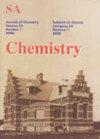Molecular docking, dynamics, and quantum chemical study of vanillylacetone and beta-hydroxy ketone derivatives against Mpro of SARS-CoV-2
IF 1
4区 化学
Q4 CHEMISTRY, MULTIDISCIPLINARY
South African Journal of Chemistry-Suid-Afrikaanse Tydskrif Vir Chemie
Pub Date : 2022-01-01
DOI:10.17159/0379-4350/2022/v76a12
引用次数: 0
Abstract
This study is carried out to find novel active drug candidates which can effectively bind to key residues of main protease (Mpro) of SARS-CoV-2. We performed molecular docking of fifty-seven (57) ligands from two classes: vanillylacetone and its derivatives and beta-hydroxy ketone derivatives against Mpro of SARS-CoV-2. We also docked three antiviral drugs as reference/benchmark drugs including remdesivir (RDV), chloroquine (CQ), and hydroxychloroquine (HCQ) against Mpro for comparison of inhibition tendencies of selected ligands. Binding energies of our reference drugs are as: CQ = -5.1 kcal mol-1 (with predicted inhibition constant (Ki pred) = 177 μmol), HCQ = -5.7 kcal mol-1 (Ki pred = 64.07 μmol) and RDV -6.3 kcal mol-1 (Ki pred = 13.95 μmol). We got remarkable results for our docked ligands as 79% of total ligands indicated binding energies better than CQ, 39 % better than both HCQ and CQ, and 19 % better than all reference drugs. More interestingly interaction analysis of eight best-docked ligands showed that they interacted with desired key residues of Mpro. We further selected the four best-docked ligands L1 = -6.6 kcal mol-1 (Ki pred =13.95 μmol), L6 = -7.0 kcal mol-1 (Ki pred = 7.08 μmol), L34 = -6.0 kcal mol-1 (Ki pred = 38.54 μmol), and L50 = -6.6 kcal mol-1 (Ki pred =13.95 umol) for further analysis by quantum chemical study, molecular dynamic (MD) simulations and ADMET analysis. We have also carried out MD-simulations of six more docked ligand L2, L14, L20, L36, L46 and L48 some of which were showing weak binding affinities and some average binding affinities to check their simulation behavior. Their RMSD, RMSF and binding free energy results were also quite satisfying. We believe the current investigation will evoke the scientific community and highlights the potential of selected compounds for potential use as antiviral compounds against Mpro of SARS-CoV-2.香草丙酮和β -羟基酮衍生物抗SARS-CoV-2 Mpro的分子对接、动力学和量子化学研究
本研究旨在寻找能有效结合SARS-CoV-2主要蛋白酶(Mpro)关键残基的新型候选活性药物。我们对来自两类的57个配体进行了分子对接:香草丙酮及其衍生物和β -羟基酮衍生物对抗SARS-CoV-2的Mpro。我们还将瑞德西韦(remdesivir, RDV)、氯喹(chloroquine, CQ)和羟氯喹(hydroxychloroquine, HCQ)三种抗病毒药物作为参比/基准对接,比较所选配体对Mpro的抑制倾向。参考药物的结合能分别为:CQ = -5.1 kcal mol-1(预测抑制常数Ki pred = 177 μmol)、HCQ = -5.7 kcal mol-1 (Ki pred = 64.07 μmol)和RDV -6.3 kcal mol-1 (Ki pred = 13.95 μmol)。我们得到了显著的结果,79%的配体的结合能优于CQ, 39%的配体结合能优于HCQ和CQ, 19%的配体结合能优于所有参考药物。更有趣的是,对八个最佳配体的相互作用分析表明,它们与Mpro所需的关键残基相互作用。我们进一步选择了L1 = -6.6 kcal mol-1 (Ki pred =13.95 μmol)、L6 = -7.0 kcal mol-1 (Ki pred = 7.08 μmol)、L34 = -6.0 kcal mol-1 (Ki pred = 38.54 μmol)和L50 = -6.6 kcal mol-1 (Ki pred =13.95 μmol)四个最佳配体进行量子化学研究、分子动力学模拟和ADMET分析。我们还对另外6种对接配体L2、L14、L20、L36、L46和L48进行了md模拟,其中一些配体的结合亲和力较弱,一些配体的结合亲和力一般,以检验它们的模拟行为。他们的RMSD、RMSF和结合自由能的结果也很令人满意。我们相信目前的研究将引起科学界的注意,并强调所选化合物作为抗病毒化合物用于对抗SARS-CoV-2的Mpro的潜力。
本文章由计算机程序翻译,如有差异,请以英文原文为准。
求助全文
约1分钟内获得全文
求助全文
来源期刊
CiteScore
3.10
自引率
0.00%
发文量
6
审稿时长
>12 weeks
期刊介绍:
Original work in all branches of chemistry is published in the South African Journal of Chemistry. Contributions in English may take the form of papers, short communications, or critical reviews.

 求助内容:
求助内容: 应助结果提醒方式:
应助结果提醒方式:


